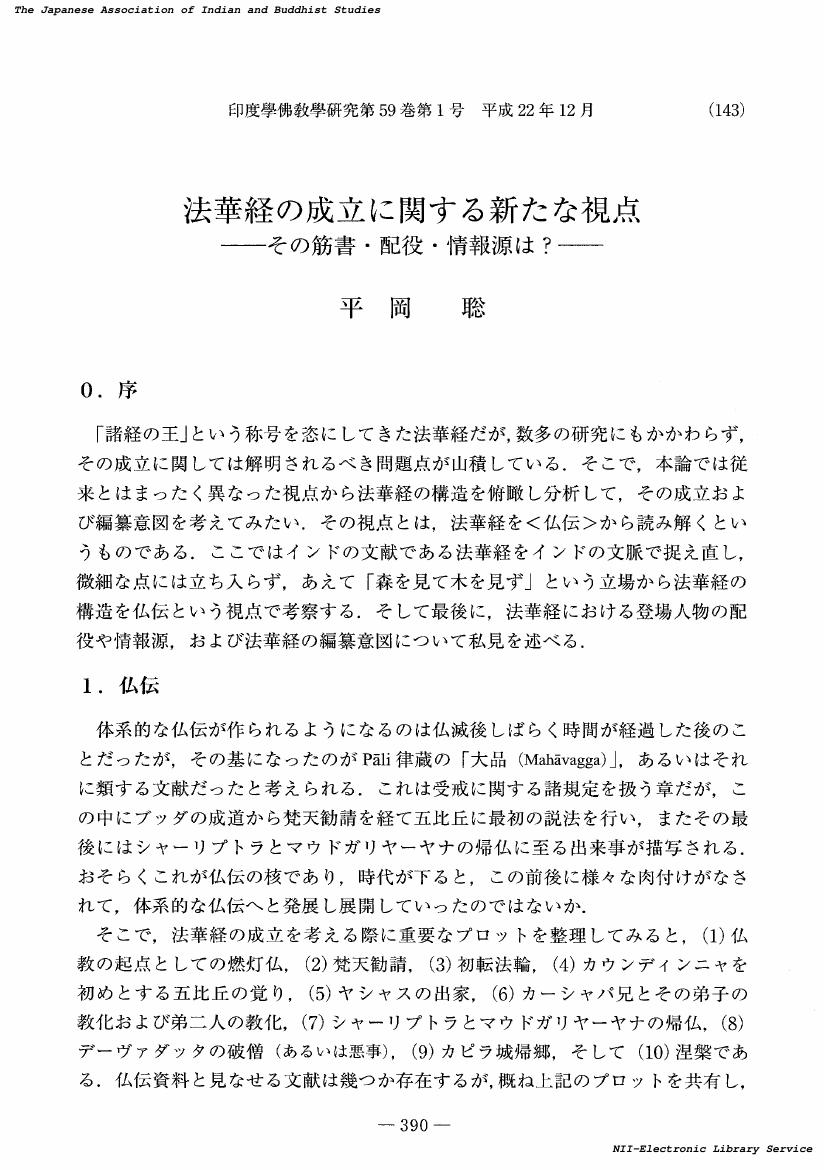33 0 0 0 OA 『大般涅槃経』における比丘と遺骨に関する儀礼--出家仏教に関する古くからの誤解
- 著者
- Schopen Gregory 平岡 聡[訳]
- 出版者
- 大谷学会
- 雑誌
- 大谷学報 = THE OTANI GAKUHO (ISSN:02876027)
- 巻号頁・発行日
- vol.76, no.1, pp.1-20, 1996-06
4 0 0 0 OA 法華経の成立に関する新たな視点 ――その筋書・配役・情報源は? ――
- 著者
- 平岡 聡
- 出版者
- 日本印度学仏教学会
- 雑誌
- 印度學佛教學研究 (ISSN:00194344)
- 巻号頁・発行日
- vol.59, no.1, pp.390-382, 2010-12-20 (Released:2017-09-01)
3 0 0 0 OA 法華経所収のジャータカの帰属部派
- 著者
- 平岡 聡
- 出版者
- 日本印度学仏教学会
- 雑誌
- 印度學佛教學研究 (ISSN:00194344)
- 巻号頁・発行日
- vol.61, no.2, pp.860-853, 2013-03-20 (Released:2017-09-01)
2 0 0 0 IR インド仏教における差別と平等の問題 ―業報輪廻説の功罪―
- 著者
- 平岡 聡 Satoshi HIRAOKA 京都文教大学臨床心理学部臨床心理学科 Kyoto Bunkyo University Department of Clinical Psychology Faculty of Clinical Psychology
- 出版者
- 京都文教大学
- 雑誌
- 臨床心理学部研究報告 = Reports from the Faculty of Clinical Psychology, Kyoto Bunkyo University (ISSN:18843751)
- 巻号頁・発行日
- vol.2, pp.65-74, 2010-03-31
This paper aims to elucidate some problems concerning discrimination and equality in Indian Buddhism from the standpoint of Buddhist karmic concepts. In understanding a religion, it is very important to clarify how the religion looks at human beings. We could easily surmise the idea of equality of human beings in Christianity, because they are thought to be equally created by God. Or we could guess the equality in Christianity from another aspect: human beings all share the original sin which was fi rst committed by Adam and Eve. Then what stance does Buddhism take concerning this problem? How has the view of humanity in Buddhism been infl uenced by karmic ideas (especially bad karma accumulated in one's past lives) corresponding to sin in Christianity? I will make clear the problem in Indian Buddhism and then consider the direction which Buddhism should take in the future.
2 0 0 0 お花見メタゲノム プロジェクト結果報告
- 著者
- 平岡 聡
- 出版者
- 日本印度学仏教学会
- 雑誌
- 印度學佛教學研究 (ISSN:00194344)
- 巻号頁・発行日
- vol.59, no.1, pp.390-382, 2010
1 0 0 0 IR アングリマーラの〈言い訳〉--不合理な現実の合理的理解
- 著者
- 平岡 聡
- 出版者
- 大谷大学佛教学会
- 雑誌
- 佛教学セミナー (ISSN:02871556)
- 巻号頁・発行日
- no.87, pp.1-28, 2008-06
1 0 0 0 慈悲としての神通・神変--有部系説話文献の用例を中心に (慈悲)
- 著者
- 平岡 聡
- 出版者
- 日本仏教学会西部事務所
- 雑誌
- 日本仏教学会年報 (ISSN:09103287)
- 巻号頁・発行日
- no.72, pp.63-76, 2006
1 0 0 0 OA 大乗涅槃経と説一切有部
- 著者
- 平岡 聡
- 出版者
- 日本印度学仏教学会
- 雑誌
- 印度學佛教學研究 (ISSN:00194344)
- 巻号頁・発行日
- vol.64, no.1, pp.340-333, 2015-12-20 (Released:2017-09-01)


